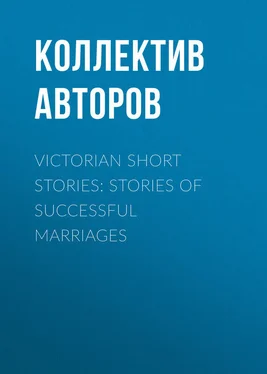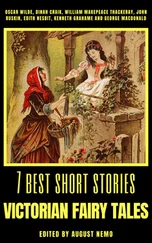Коллектив авторов - Victorian Short Stories - Stories of Successful Marriages
Здесь есть возможность читать онлайн «Коллектив авторов - Victorian Short Stories - Stories of Successful Marriages» — ознакомительный отрывок электронной книги совершенно бесплатно, а после прочтения отрывка купить полную версию. В некоторых случаях можно слушать аудио, скачать через торрент в формате fb2 и присутствует краткое содержание. Жанр: foreign_antique, foreign_prose, на английском языке. Описание произведения, (предисловие) а так же отзывы посетителей доступны на портале библиотеки ЛибКат.
- Название:Victorian Short Stories: Stories of Successful Marriages
- Автор:
- Жанр:
- Год:неизвестен
- ISBN:нет данных
- Рейтинг книги:5 / 5. Голосов: 1
-
Избранное:Добавить в избранное
- Отзывы:
-
Ваша оценка:
- 100
- 1
- 2
- 3
- 4
- 5
Victorian Short Stories: Stories of Successful Marriages: краткое содержание, описание и аннотация
Предлагаем к чтению аннотацию, описание, краткое содержание или предисловие (зависит от того, что написал сам автор книги «Victorian Short Stories: Stories of Successful Marriages»). Если вы не нашли необходимую информацию о книге — напишите в комментариях, мы постараемся отыскать её.
Victorian Short Stories: Stories of Successful Marriages — читать онлайн ознакомительный отрывок
Ниже представлен текст книги, разбитый по страницам. Система сохранения места последней прочитанной страницы, позволяет с удобством читать онлайн бесплатно книгу «Victorian Short Stories: Stories of Successful Marriages», без необходимости каждый раз заново искать на чём Вы остановились. Поставьте закладку, и сможете в любой момент перейти на страницу, на которой закончили чтение.
Интервал:
Закладка:
So passed away the first days of Alice's widowhood. By and by things subsided into their natural and tranquil course. But, as if the young creature was always to be in some heavy trouble, her ewe-lamb began to be ailing, pining, and sickly. The child's mysterious illness turned out to be some affection of the spine, likely to affect health but not to shorten life – at least, so the doctors said. But the long, dreary suffering of one whom a mother loves as Alice loved her only child, is hard to look forward to. Only Norah guessed what Alice suffered; no one but God knew.
And so it fell out, that when Mrs Wilson, the elder, came to her one day, in violent distress, occasioned by a very material diminution in the value of the property that her husband had left her – a diminution which made her income barely enough to support herself, much less Alice – the latter could hardly understand how anything which did not touch health or life could cause such grief; and she received the intelligence with irritating composure. But when, that afternoon, the little sick child was brought in, and the grandmother – who, after all, loved it well – began a fresh moan over her losses to its unconscious ears – saying how she had planned to consult this or that doctor, and to give it this or that comfort or luxury in after years, but that now all chance of this had passed away – Alice's heart was touched, and she drew near to Mrs Wilson with unwonted caresses, and, in a spirit not unlike to that of Ruth, entreated that, come what would, they might remain together. After much discussion in succeeding days, it was arranged that Mrs Wilson should take a house in Manchester, furnishing it partly with what furniture she had, and providing the rest with Alice's remaining two hundred pounds. Mrs Wilson was herself a Manchester woman, and naturally longed to return to her native town; some connexions of her own, too, at that time required lodgings, for which they were willing to pay pretty handsomely. Alice undertook the active superintendence and superior work of the household; Norah – willing, faithful Norah – offered to cook, scour, do anything in short, so that she might but remain with them.
The plan succeeded. For some years their first lodgers remained with them, and all went smoothly – with that one sad exception of the little girl's increasing deformity. How that mother loved that child, it is not for words to tell!
Then came a break of misfortune. Their lodgers left, and no one succeeded to them. After some months, it became necessary to remove to a smaller house; and Alice's tender conscience was torn by the idea that she ought not to be a burden to her mother-in-law, but to go out and seek her own maintenance. And leave her child! The thought came like the sweeping boom of a funeral-bell over her heart.
By and by, Mr Openshaw came to lodge with them. He had started in life as the errand-boy and sweeper-out of a warehouse; had struggled up through all the grades of employment in it, fighting his way through the hard, striving Manchester life with strong, pushing energy of character. Every spare moment of time had been sternly given up to self-teaching. He was a capital accountant, a good French and German scholar, a keen, far-seeing tradesman – understanding markets and the bearing of events, both near and distant, on trade; and yet, with such vivid attention to present details, that I do not think he ever saw a group of flowers in the fields without thinking whether their colour would, or would not, form harmonious contrasts in the coming spring muslins and prints. He went to debating societies, and threw himself with all his heart and soul into politics; esteeming, it must be owned, every man a fool or a knave who differed from him, and overthrowing his opponents rather by the loud strength of his language than the calm strength of his logic. There was something of the Yankee in all this. Indeed, his theory ran parallel to the famous Yankee motto – 'England flogs creation, and Manchester flogs England.' Such a man, as may be fancied, had had no time for falling in love, or any such nonsense. At the age when most young men go through their courting and matrimony, he had not the means of keeping a wife, and was far too practical to think of having one. And now that he was in easy circumstances, a rising man, he considered women almost as encumbrances to the world, with whom a man had better have as little to do as possible. His first impression of Alice was indistinct, and he did not care enough about her to make it distinct. 'A pretty, yea-nay kind of woman', would have been his description of her, if he had been pushed into a corner. He was rather afraid, in the beginning, that her quiet ways arose from a listlessness and laziness of character, which would have been exceedingly discordant to his active, energetic nature. But, when he found out the punctuality with which his wishes were attended to, and her work was done; when he was called in the morning at the very stroke of the clock, his shaving-water scalding hot, his fire bright, his coffee made exactly as his peculiar fancy dictated (for he was a man who had his theory about everything based upon what he knew of science, and often perfectly original) – then he began to think: not that Alice had any particular merit, but that he had got into remarkably good lodgings; his restlessness wore away, and he began to consider himself as almost settled for life in them.
Mr Openshaw had been too busy, all his days, to be introspective. He did not know that he had any tenderness in his nature; and if he had become conscious of its abstract existence he would have considered it as a manifestation of disease in some part of him. But he was decoyed into pity unawares; and pity led on to tenderness. That little helpless child – always carried about by one of the three busy women of the house, or else patiently threading coloured beads in the chair from which, by no effort of its own, could it ever move – the great grave blue eyes, full of serious, not uncheerful, expression, giving to the small delicate face a look beyond its years – the soft plaintive voice dropping out but few words, so unlike the continual prattle of a child – caught Mr Openshaw's attention in spite of himself. One day – he half scorned himself for doing so – he cut short his dinner-hour to go in search of some toy, which should take the place of those eternal beads. I forget what he bought; but, when he gave the present (which he took care to do in a short abrupt manner, and when no one was by to see him), he was almost thrilled by the flash of delight that came over that child's face, and he could not help, all through that afternoon, going over and over again the picture left on his memory, by the bright effect of unexpected joy on the little girl's face. When he returned home, he found his slippers placed by his sitting-room fire; and even more careful attention paid to his fancies than was habitual in those model lodgings. When Alice had taken the last of his tea-things away – she had been silent as usual till then – she stood for an instant with the door in her hand. Mr Openshaw looked as if he were deep in his book, though in fact he did not see a line; but was heartily wishing the woman would go, and not make any palaver of gratitude. But she only said:
Читать дальшеИнтервал:
Закладка:
Похожие книги на «Victorian Short Stories: Stories of Successful Marriages»
Представляем Вашему вниманию похожие книги на «Victorian Short Stories: Stories of Successful Marriages» списком для выбора. Мы отобрали схожую по названию и смыслу литературу в надежде предоставить читателям больше вариантов отыскать новые, интересные, ещё непрочитанные произведения.
Обсуждение, отзывы о книге «Victorian Short Stories: Stories of Successful Marriages» и просто собственные мнения читателей. Оставьте ваши комментарии, напишите, что Вы думаете о произведении, его смысле или главных героях. Укажите что конкретно понравилось, а что нет, и почему Вы так считаете.

![Коллектив авторов - Best Short Stories [С англо-русским словарем]](/books/26635/kollektiv-avtorov-best-short-stories-s-anglo-thumb.webp)










